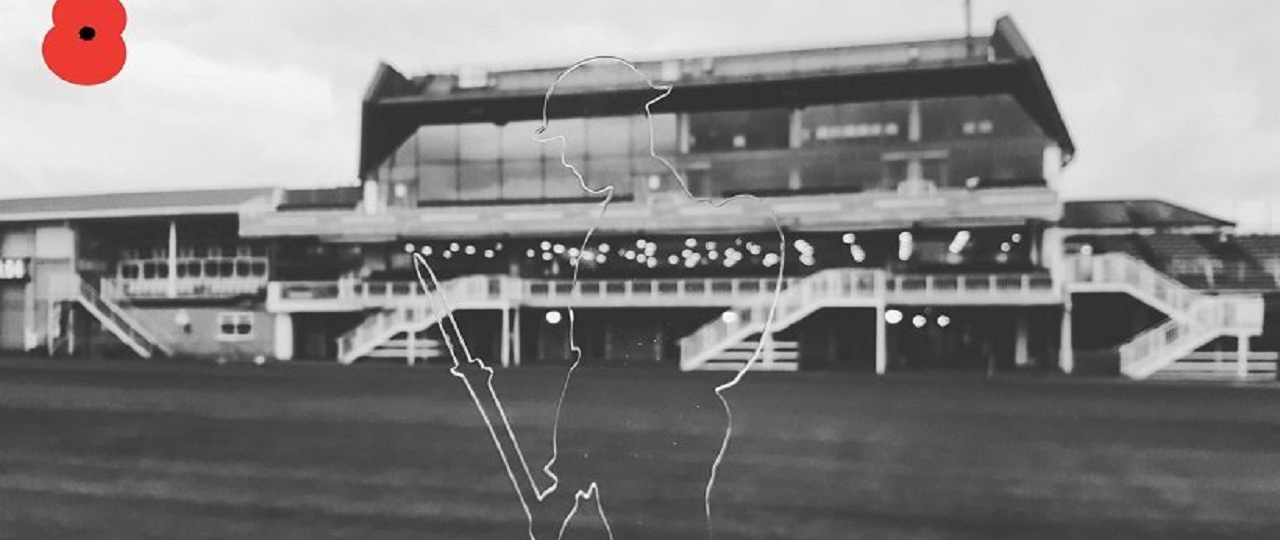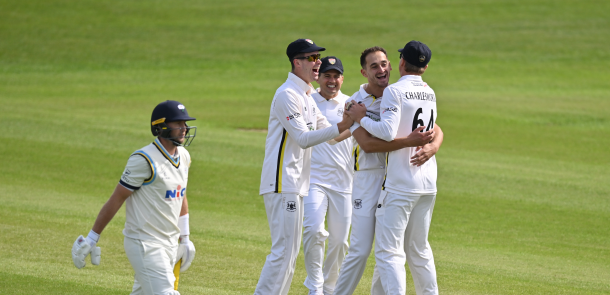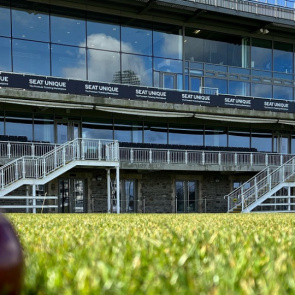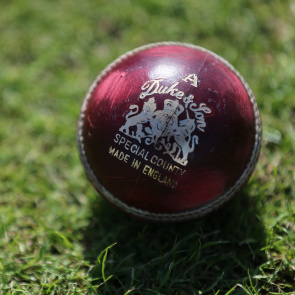Casualties of War - Gloucestershire Cricket Remembers
11 November 2021

The Athletic News of Monday 25 October 1915 reported that, on the previous Saturday, Bristol Rovers had recovered from a two goal deficit to beat Southampton by four goals to two, whilst at Newport, Bristol City, with “not a weak spot in their team” had defeated Newport County by three goals to one. At a national level, the page 3 headline advised that “Chelsea Capitulate” as they lost by the only goal of the match at Queens Park Rangers.
There had been an extensive programme of football for the paper to report, but the main headlines concerned the death on that same day of the man whose presence had dominated the world of sport in general and cricket in particular for over fifty years.
“The King of Cricket, William Gilbert Grace has passed to the Great Beyond” ran the leading article “He has left no successor to that title. Men of his pre-eminence in any walk of life are rare.”
He had suffered a relatively mild stroke some two weeks previously whilst working in his garden. It had slightly affected his speech and he had been put to bed to rest. The following week, the Germans had launched their great Zeppelin raids, one of their targets being the Woolwich Arsenal, just a few miles away from Grace’s home in Mottingham. The sounds of the explosions were heard all over London. Simon Rae in his book W.G. Grace – A Life recounts the story of how Grace’s old cricketing friend H.D. “Shrimp” Leveson-Gower, “trying to josh him out of his depression,” asked him how he could be bothered by Zeppelins, having seen off generations of fast bowlers. Grace’s now famous reply was that he “could see those beggars, I can’t see these.” Ten days later, he suffered a heart attack and passed away. It seems clear that the raids had been a worry to the great man and were probably a contributory cause to the fatal attack and the Great War had, although indirectly claimed possibly its most famous victim.
At the time of his death, eight cricketers who had played for Gloucestershire and had taken part in the conflict had already lost their lives; a further ten were to suffer the same fate before the war was over
Of the eighteen, most played fewer than ten times but here are the stories of four who played more often.
Wilfred Methven Brownlee played 32 games from 1909.
Born in Bristol in 1890, he was the younger son of W.G. Grace’s biographer and friend William Methven Brownlee. Along with his older brother Leigh, he was educated at Clifton College where they both appeared in the Cricket XI and he followed him into the Gloucestershire team. An all-round cricketer he topped the Clifton batting averages in 1908 and the bowling averages in 1907 and 1909. His 49 wickets in 1908 were the most for the school since the early 1890s when a young Charles Townsend in three seasons took 199 wickets. With such a background it was a natural step into the Gloucestershire XI but a job in Derby as a schoolmaster meant that his appearances for the County were limited to the school holidays.
In the six seasons from 1909 to 1914 he appeared a total of 32 times scoring 764 runs at an average of 16.25 with a highest score of 68 against Northants in 1910. His bowling brought him 40 wickets at an average of 29.30 with a best of 6-84 against Worcestershire in 1910. He also played one match in 1909 at the end of season Hastings Festival when for the Gentlemen of the South he took 6-61 against the Players of the South.
Enlisting in August 1914 as a Private Soldier in the 6th Battalion, Gloucestershire Regiment, he was within a matter of weeks awarded a commission as a Second Lieutenant in the 3rd Battalion, Dorsetshire Regiment with whom he was in training at Wyke Regis. In his book For Club King and Country, Martin Davies says of Brownlee that “His death would typify that of many others who had been plucked from the relative comfort and safety of a home environment and thrust into the harsh and demanding one of the British Army as it prepared its young men for what would be the unimaginable rigours and hardships of the battlefield. Within weeks of his arrival at the camp Wilfred had contracted and died of meningitis.
As a casualty of war the whole of the military establishment at Weymouth followed his coffin, draped in the Union Flag and decorated with a full length floral cross to the railway station where a salute was fired over his body.” He was buried alongside his father at Arnos Vale Cemetery in Bristol. The Army had offered full military honours but the offer was declined by the family who requested a quiet and simple service.
Theodore Humphrey Fowler played 46 games from 1901
Of the eighteen players who lost their lives, all but three had served as officers. One of the exceptions was Theo. Fowler. Born in Cirencester in 1879 where his father Oliver was a doctor in the town, he was educated at Grange House School in East Grinstead and Lancing College, where he was a member of the Cricket XI from 1894 to 1898, topping the batting averages in 1896. Returning to Cirencester he resumed his playing career which had commenced in his early teenage years with the town club.
He was selected to play in two of the early season County trial matches in 1901 and coming into the eleven at the end of May, he played in fifteen matches scoring 440 runs at an average of 18.33. Over the next four years, a further 25 appearances saw him make his only first-class century in 1903 against W.G. Grace’s London County XI. Opening the batting with Harry Wrathall he scored 114 in an opening partnership of 277 before being stumped off the bowling of the 55 year old W.G. who took 6 -102 and then proceeded to score 150 as London County won the game by seven wickets. A period away from home between 1908 and 1912 working in Weymouth as a brewer at John Groves’ brewery saw Fowler playing Minor Counties cricket for Dorset.
Returning to Cirencester he made a final four appearances for Gloucestershire in 1914. On the outbreak of war he enlisted into the University and Public Schools Corps at Epsom but subsequently joined the Honourable Artillery Company landing in France at the end of December 1914. Wounded in action in both March and April 1915 he was found in the middle of June to be suffering from shell shock and by the end of the month also from a hernia. He was moved initially to one of the Casualty Clearing Stations and then subsequently to the County of London War Hospital in Epsom where he died on 17 August of a fever, possibly as the result of an infection following an operation on his hernia. He is buried in Cirencester. In his will, he left the sum of £200 to his old Cirencester and Gloucestershire team mate Cyril Sewell who captained the County XI in 1914 “in recognition of many good times together”.
John William Washington Nason played 19 games in 1913 and 1914
Born at Corse Grange near Tewkesbury in 1889 he was the son of Dr. Charles Nason. Irish born Charles was the local doctor but in 1897 the family moved to Hastings where he took up a new appointment. John proved to be a good young cricketer both at the University School in the town and for one of the town clubs, Hastings Rovers. As a seventeen year old he made a surprise County debut for Sussex against Warwickshire at Hastings in 1906. Early in the game the Sussex bowler J.E.B.B.Q.C. Dwyer split a finger of his bowling hand going for a catch and was not able to take any further part in the game.
The Warwickshire captain James Byrne allowed Nason to replace Dwyer as a full substitute. A score of 53 not out in the Sussex second innings saw him retain his place for the final game of the Hastings Cricket week against Essex. Occasional matches for Sussex in 1907 and 1908 were followed by two years at Queen’s College Cambridge where he won his blue in both years without ever achieving anything spectacular before returning to the family home in Hastings where he was employed as a private schoolmaster. Cricket appears to have disappeared from his life until the Hastings and St. Leonards Observer announced in May 1913 that “Mr. J.W.W. Nason who is so well known to Hastings is going to play for Gloucestershire this season. He has a birth qualification for the western county. It seems a pity that Sussex is not to have the benefit of his mature cricket.”
Making his debut for Gloucestershire against Somerset he went on to play sixteen games during the season. This included an innings of 139 against Notts at Gloucester, his only first-class century, an innings that caused the indignant Hastings and St. Leonards Observer to write about “certain unsatisfactory decisions arrived at by the Sussex County Cricket Club” and to question why he had been allowed to be released by Sussex saying that “his transference to the Western County is not made more pleasant for Sussex people by the fact that he is in rattling good form and played a brilliant innings against Notts.”
At the start of the 1914 season, however, the Western Daily Press was reporting that “J.W. Nason does not seem to be in a hurry to make up his mind to play county cricket this season” although this was possibly influenced by the fact that in April he had been injured in “a serious motor smash” at Bexhill when returning to Hastings from Cooden Beach Golf Links; the car he was driving skidded, running into a bank throwing him and a fellow passenger into the road. In the event, he did play just three games in June that season. In August 1914 he enlisted as a driver in 75 Brigade, Royal Artillery, obtained a Commission in November and joined the Royal Sussex Regiment as a Second Lieutenant. He then took a flying course at the RFC Training Centre, Curragh and was appointed as a Flying Officer in September 1916. He was described as “an extremely useful pilot” but was killed by enemy action on Boxing Day 1916 during a flight over the Ypres Salient. Together with an observer, he was on a photographic patrol east of Ypres when he was attacked by a German aircraft and the plane was brought down killing both men in the crash.
Francis Bernard Roberts played 67 games from 1906
Born in India in 1882 Frank Roberts was the son of the Reverend Wilson Roberts. Wilson Roberts was a minister with the Church Missionary Society in India so with his parents spending most of their time in that country, Roberts was sent back to England to be educated at Magdalen College School Oxford, and Rossall School where he was in the Cricket XI from 1898 to 1900. He was the leading wicket taker in his last three years during which time he either topped or came second in the batting averages, Two years at Jesus College Cambridge in 1903 and 1904 reading Classics saw him win his blue for cricket in both years along with a blue for hockey. After leaving Cambridge a teaching appointment at Wellington College meant that he was only available to play county cricket during the summer holidays. With his parents now home from India and living just outside Gloucester and a younger brother Edward being the vicar of Cam near Dursley, he became a regular member of the County eleven from the end of July each year from 1906 onwards.
Of his debut against Middlesex, the Gloucester Citizen said of him that “Few amateur bowlers who have been tried for Gloucestershire of late years have performed better upon their initial appearance” and the Bristol Times and Mirror that “he did enough to show that he is worthy of a good trial” Most end of season and pre-season press reports mention how well he had played or how much he would be missed for the early part of the season. His batting, whilst never outstanding was good - in modern parlance he would probably be described as a batsman who bowled a bit - and included five centuries. His second century, 129 in the second innings against Surrey at Bristol in 1909, following 88 in the first innings, came in the only match in which he captained the side. He had taken over from his brother Arthur, who, in turn, had taken over from the injured Gilbert Jessop. Of his 138 against Worcester at Cheltenham in 1911, the Cheltenham Looker On reported that he had “out Jessoped Jessop … his was a cheerful innings and greatly pleased the crowd” Possibly here was an amateur with prospects of a good career ahead of him.
These were four of the eighteen first-class cricketers who lost their lives in the Great War. All eighteen are commemorated on a memorial tablet, commissioned by GCCC Heritage Trust, which is situated within the Museum and Learning Centre at the Bristol County Ground.
Roll of honour
Click here for a full list.
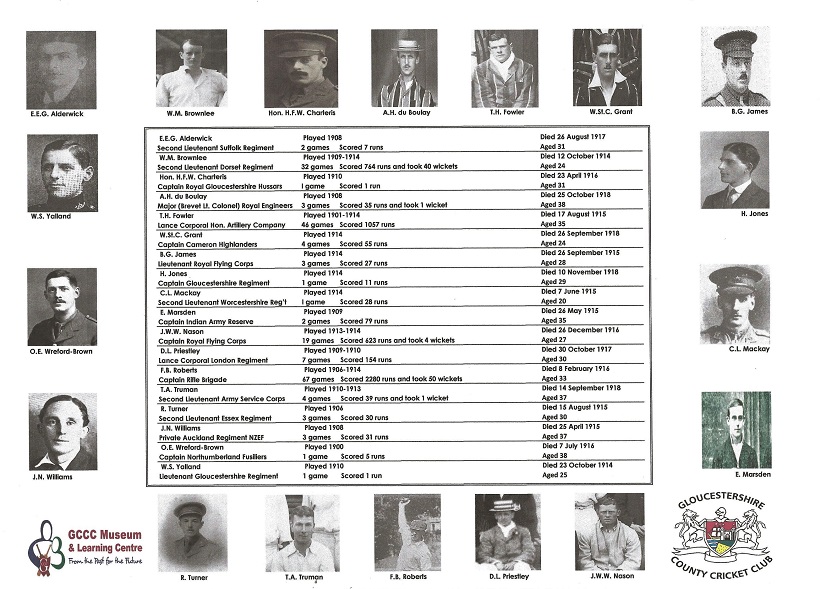
Roger Gibbons
Club President/Club Archivist
Information on all eighteen players can be found in the booklet In Memoriam – Gloucestershire County Cricketers Killed in the Great War which is available from GCCC Heritage Trust: gcccht2014@gmail.com



